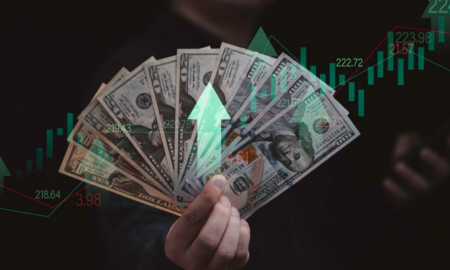
Why The “Velocity” Of Money Has Plummeted?

The “velocity” of money is the frequency at which one unit of currency is used to purchase goods and services within a given period. It is an important metric for understanding the economy’s robustness and how well money circulates through the system. When the velocity of money is high, this generally indicates that people are spending freely and providing a boost to economic growth.

Karolina / Pexels / Moving cash is the symbol of a growing economy – and vice versa!
On the other hand, when it is low, it can be a sign that consumers are being more cautious with their spending, resulting in slower economic growth.
Why Has the Velocity of Money Plummeted?
In recent years, several factors have contributed to a decrease in the velocity of money. One such factor is the economic recession that began in 2008. During this time, consumer spending decreased, causing businesses to pull back on investments and reduce hiring. This, in turn, caused even more consumers to become cautious with their spending, creating a downward spiral for the economy.
More recently, the coronavirus pandemic has also impacted the velocity of money. With governments worldwide recommending that people stay home and practice social distancing to slow the spread of the virus, many businesses were forced to close or limit operations. This has led to widespread job losses and reduced consumer confidence, resulting in people cutting back on their spending, further lowering the velocity of money.

Karolina / Pexels / The mayhem of the coronavirus pandemic and the looming recession are responsible for making money stagnant.
What Does It Mean?
The lower velocity of money can have a variety of negative effects on the economy. For instance, since people are spending less, businesses may be reluctant to hire new employees and make capital investments. This can lead to decreased economic activity and slower growth.
Additionally, the low velocity of money also results in lower levels of inflation which can push interest rates down, making borrowing more expensive for businesses and individuals.
However, the good news is that there are steps that governments and central banks can take to help mitigate the effects of the low velocity of money. For example, central banks may reduce interest rates or introduce stimulus packages to encourage consumer spending.
Governments may also increase public spending in certain areas, such as infrastructure projects which could create jobs and boost economic growth in those sectors.

Karolina / Pexels / As the velocity of money plummets, the inflation rate goes up.
The Importance of Moving Cash
The velocity of money is an important measure of economic health because it indicates how well money circulates throughout the economy. The high velocity of money means that people are spending their income and businesses are investing in their operations, which helps to create jobs and boost economic growth.
Conversely, the low velocity of money can lead to slower economic activity as consumers become more cautious with their spending. One way to increase the velocity of money is to encourage people to move cash around in the economy by making transactions more efficient.
This could involve using digital payment methods such as contactless cards or mobile wallets to make purchases. Eventually, reducing processing times for cheques or other payments or implementing measures that make it easier for small businesses to accept digital payments from customers.
More in Finance
-
`
The Unique Tradition of the SAG Awards: No Hosts!
The Screen Actors Guild (SAG) Awards, a prestigious event in the entertainment industry, has a unique tradition that sets it apart...
March 9, 2024 -
`
Essential 2024 Startup Know-How for Women | Beginning Your Business Journey
Forget the tired trope of the lone wolf entrepreneur. Today, women are shattering glass ceilings and redefining what it means to...
February 27, 2024 -
`
Microsoft and OpenAI Sound Alarm Over AI Hacking
A recent joint study by Microsoft and OpenAI raises concerns as it unveils attempts by state-backed hacker groups to exploit AI...
February 25, 2024 -
`
Invest with Confidence: Identifying 5 Key Company Traits for Success
When investing hard-earned money in stocks, we all want the reassurance that comes from placing bets on reliable horses. But how...
February 15, 2024 -
`
Roger O’Donnell’s Heartfelt Message to Morrissey Amidst ‘Medical Supervision’
When news broke that Morrissey, the iconic frontman of The Smiths, was placed under “medical supervision for physical exhaustion,” the music...
February 10, 2024 -
`
Six Flags and Cedar Fair Merger: A Thrilling Venture Under DOJ Scrutiny
Picture this: two giants of the amusement park world, Six Flags Entertainment and Cedar Fair, coming together in a colossal merger,...
February 3, 2024 -
`
A Peek Inside NASA’s Latest Supersonic Aircraft, the X-59
In the annals of aviation, breaking the sound barrier has always been a loud affair. But NASA, in partnership with Lockheed...
January 22, 2024 -
`
The Easiest Personal Loans to Secure Your Financial Freedom in 2024
Embarking on a journey toward financial stability often requires a helping hand, and personal loans emerge as versatile allies in this...
January 21, 2024 -
`
Emily Atack Baby Joy: A Peek into Her Life with Boyfriend Dr. Alistair Garner
New beginnings and a tiny miracle: The year 2024 has kicked off with a beautiful surprise for fans of Emily Atack,...
January 10, 2024














You must be logged in to post a comment Login